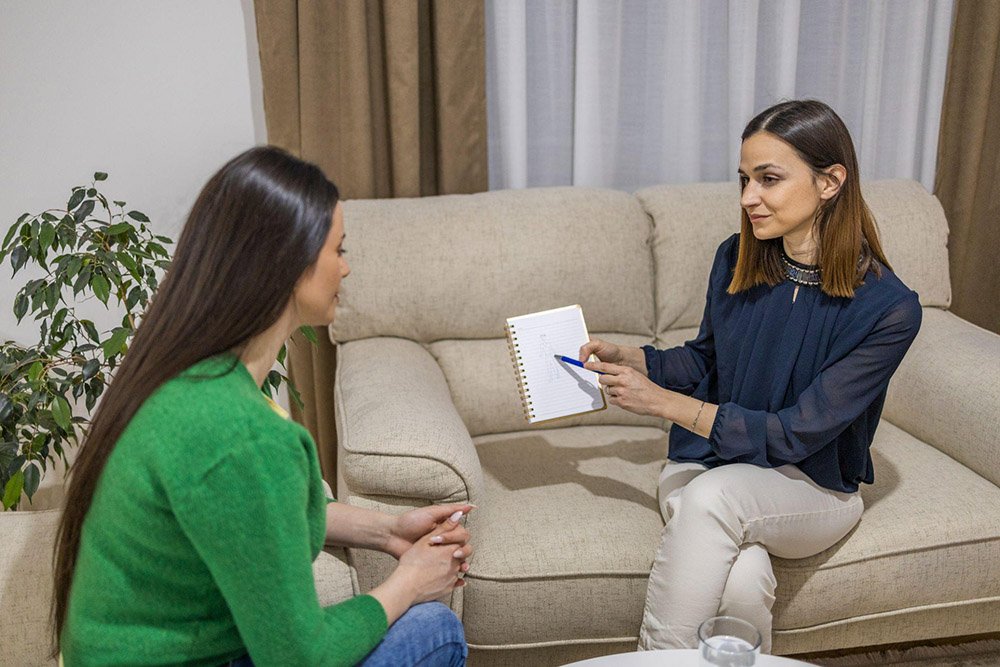Skip to the good bit
ToggleNavigating your first counselling session can feel overwhelming, but understanding what to expect can ease your nerves. The initial meeting typically involves discussing your background and therapy goals, allowing your therapist to explain their approach and any relevant techniques they’ll use. This blog post explores how to effectively prepare for your counselling session, providing valuable tips that enhance your experience and foster meaningful conversations. From setting clear goals to journaling your thoughts, these practical strategies will help your personal growth and development.
What is Cognitive Behavior Therapy?
Cognitive-behavioral therapy (CBT) is a structured, goal-oriented approach that identifies and changes negative thought patterns and behaviours. It combines cognitive therapy, which addresses how thoughts influence feelings, with behavioural therapy, which focuses on changing actions. CBT techniques help individuals develop coping strategies, enhancing emotional readiness for challenges in their daily lives.
What Does CBT Treat?
Cognitive-behavioral therapy is effective for a variety of mental health issues, including:
- Anxiety disorders: Generalized anxiety disorder, social anxiety disorder, and panic disorder.
- Depression: Major depressive disorder and persistent depressive disorder (dysthymia).
- Post-Traumatic Stress Disorder (PTSD): Assists individuals in processing and coping with trauma.
- Obsessive-Compulsive Disorder (OCD): Reduces compulsive behaviours and obsessive thoughts.
- Eating disorders: Including bulimia nervosa and binge eating disorder.
- Phobias: Fear of specific objects or situations, such as heights or spiders.
- Stress management: Techniques to cope with stress and improve emotional regulation.
- Substance use disorders: Helps manage triggers and develop coping strategies.
- Sleep disorders: Addresses thought patterns affecting sleep, including insomnia.
- Chronic pain management: Aids individuals in coping with pain using cognitive and behavioural strategies.
The Importance of Counselling Session Preparation

Preparing for a counselling session is essential for maximizing your therapy experience. Reflecting on your goals, jotting down discussion topics, and being honest about your needs pave the way for better communication with your therapist. Arriving with focus and intention creates opportunities for deeper conversations and meaningful progress in your mental health journey. Visit https://counsellinginstitute.ca/cognitive-behavioral-therapy/ to book a consultation and set up your first therapy session.
Fosters Effective Communication
Open dialogue enriches the therapeutic alliance. Preparing for therapy by noting topics and questions encourages productive conversations. When clients express their needs, therapists can adjust their strategies to provide the best support.
Builds Rapport
Success in therapy often depends on the comfort level between the client and therapist. Engaging in thorough therapy session preparation builds trust and rapport. Arriving prepared fosters an environment conducive to honest communication, maximizing the benefits of therapy.
Promotes Accountability
Preparing for each session encourages individuals to participate actively in their mental health journey. This accountability includes reflecting on progress, committing to the therapeutic process, and being receptive to feedback. Active engagement increases the likelihood of positive outcomes.
Supports Cognitive and Behavioral Techniques
Understanding various CBT techniques in cognitive-behavioural therapy enhances clients’ ability to apply them outside sessions. Familiarity with cognitive distortions and behavioural activation allows clients to incorporate these strategies into daily life, making preparation essential for effective practice.
Tips for How to Prepare for Counselling

Preparing for counselling can make a significant difference in your therapy experience. With the right mindset and tools, you can maximize your time with your therapist and create a more impactful journey. Here are some useful tips for counselling session preparation:
Set Clear Goals
Reflect on what you hope to achieve in therapy. Whether it’s understanding yourself better, managing anxiety through CBT for anxiety, or improving relationships, having specific goals keeps you focused. Write down these objectives to guide your discussions during sessions. Setting particular objectives keeps you and your therapist aligned throughout the process.
Journal Your Thoughts
Before your session, spend a little time journaling about your thoughts and feelings. This practice helps clarify your emotions and brings awareness to any patterns you notice. Consider noting down any significant events or triggers that you want to discuss. Journaling is a powerful tool for counselling session preparation, aiding in self-reflection. It also helps reveal patterns in your thinking, especially if you’re experiencing cognitive distortions.
Prepare Questions
Creating a list of questions and topics to discuss can keep your session organized. Consider any concerns, topics you want to explore, or questions about the therapeutic process. Go beyond the basics—consider inquiries about their approach to treatment, such as cognitive-behavioural therapy or specific CBT techniques they may use. Examples of questions include:
- What should I expect in a typical session?
- How can I apply behavioural therapy techniques outside of our sessions?
- How will we measure progress?
Having these questions ready encourages open dialogue and enhances your understanding of the process.
Familiarize Yourself with Therapy Techniques
Understanding the therapeutic methods your counsellor might use can ease any apprehension. Explore concepts related to cognitive therapy, such as cognitive distortions and thought restructuring, behavioural activation, and mindfulness practices. Being familiar with these concepts can help you apply them daily, making your therapy sessions even more effective.
Practice Self-Care
Prioritize self-care leading up to your session. Engage in activities that relax you, whether exercise, meditation or simply time in nature. Taking care of your emotional and physical well-being enhances your ability to face challenging topics openly and honestly during therapy.
Build Rapport
Establishing a connection with your therapist is essential for a successful therapeutic alliance. Approach your sessions with honesty and openness. Share your thoughts, feelings, and any concerns about the process. A trusting relationship encourages deeper discussions and leads to greater insights.
Be Open and Honest
Therapy thrives on transparency. Be ready to share your experiences without fear of judgment. The more honest you are about your struggles and aspirations, the better equipped your therapist will be to tailor their approach to your needs.
Plan for a Post-Session Reflection
Allocate time after your sessions for personal reflection. Consider what you’ve learned and how it applies to your life. Writing down your thoughts or discussing them with a trusted friend can help reinforce insights gained during therapy.
Effective counselling session preparation sets the foundation for meaningful growth and change. Setting clear goals, journaling, preparing questions, and practicing self-care enhance your therapy experience. Each step in preparation brings you closer to better mental health.
Your Mental Health Matters – Schedule Your Session Today
Understanding what to expect in a counselling session can ease your anxiety. Don’t let fear or uncertainty hold you back. Preparing for therapy can set you up for success. A caring team is ready to guide you every step of the way. Take the first step toward improving your mental health with a professional counselling session. Book a session today and start your journey toward a better, healthier you.







